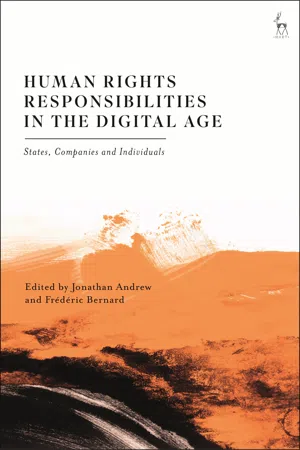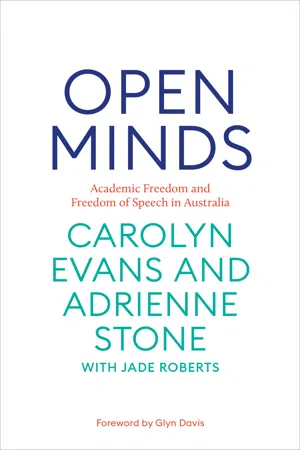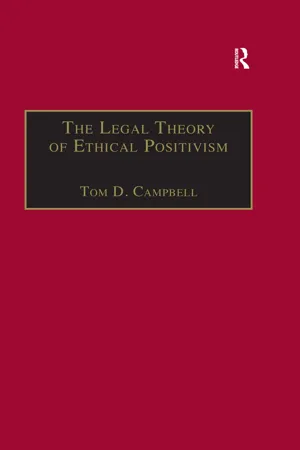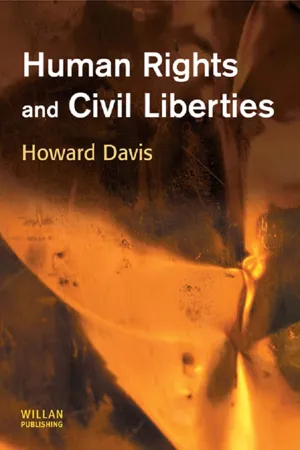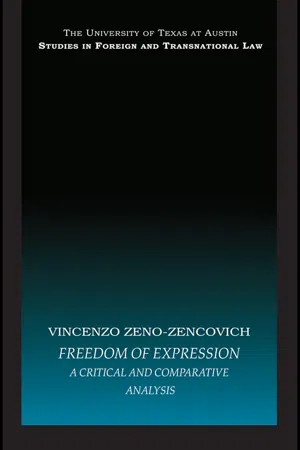Freedom of Speech
Freedom of speech refers to the right to express opinions and ideas without censorship or restraint. It is a fundamental principle in democratic societies, allowing individuals to participate in public discourse, criticize the government, and advocate for change. However, it also raises debates about the limits of free speech, particularly concerning hate speech, incitement to violence, and national security.
5 Key excerpts on "Freedom of Speech"
- eBook - ePub
Human Rights Responsibilities in the Digital Age
States, Companies and Individuals
- Jonathan Andrew, Frédéric Bernard, Jonathan Andrew, Frédéric Bernard(Authors)
- 2021(Publication Date)
- Hart Publishing(Publisher)
...8 Freedom to Think and to Hold a Political Opinion: Digital Threats to Political Participation in Liberal Democracies JÉRÔME DUBERRY I. Introduction Freedom of opinion is closely linked to both freedom of thought and freedom of expression: people need to be able to consider a wide range of media in order to form their own opinions. This is particularly important for citizens making political decisions, as a young Benjamin Franklin, under the moniker Silence Dogood, argued in 1722: Without freedom of thought, there can be no such thing as wisdom; and no such thing as public liberty. Freedom of Speech is the right of every man, as far as by it, he does not hurt or control the right of others. And this is the only check it ought to suffer, and the only bounds it ought to know. This sacred privilege is so essential to free governments, that the security of property, and the Freedom of Speech always go together; and in those wretched countries where a man cannot call his tongue his own, he can scarce call anything else his own. Whoever would overthrow the liberty of a nation must begin by subduing the freeness of speech. 1 With more and more information being shared online, it would seem that expression has never been so free and yet this abundance is strangely not benefitting freedom of thought or freedom of opinion. Indeed, the same technologies that opened up access to information and empowered civil society are now being used to harvest personal data and target people with disinformation, with grave consequences for democracy. In November 2018, Nobel laureates Joseph Stiglitz, Shirin Ebadi and Mario Vargas Llosa were among 25 public figures calling for democratic guarantees on freedom of opinion. 2 The Information and Democracy Commission published an ‘International Declaration on Information and Democracy’ that could serve as a working basis for political leaders...
- eBook - ePub
Open Minds
Academic freedom and freedom of speech of Australia
- Carolyn Evans, Adrienne Stone(Authors)
- 2020(Publication Date)
- La Trobe University Press(Publisher)
...Freedom of Speech AND ITS LIMITS F reedom of speech is a universally protected right in the constitutions of the world’s democracies and a central tenet of political liberalism. 1 An enormous literature on the justifications for Freedom of Speech has settled on three principal lines of justification: Freedom of Speech is essential to the search for ‘truth’ (the argument from truth), it is necessary for or constitutive of a dignified and autonomous life (the argument from autonomy), and it is a necessary condition for democratic self-government (the argument from democracy). 2 At the level of political rhetoric, Freedom of Speech is easy to support. Almost everyone agrees on its importance, and it is often publicly defended, in universities and elsewhere, in rousing terms. Nonetheless, there remain deep and intractable controversies about how Freedom of Speech is best realised. For the most part, the debate about Freedom of Speech in universities focuses on the extent to which otherwise legal speech can or should be restricted. There is a temptation to view any restrictions or burdens placed on public expression as violations of Freedom of Speech. In public debate, we often hears declarations like ‘either free speech is for everyone or no one’, ‘free speech cannot just be for ideas we like’ or the Voltaire-inspired ‘I disapprove of what you say, but I will defend to the death your right to say it’. 3 Free speech absolutism is fuelled by many grand statements of principle. The US Supreme Court is responsible for much of the most inspiring writing about Freedom of Speech. Justice Benjamin N. Cardozo said, ‘Freedom of expression is the matrix, the indispensable condition, of nearly every other form of freedom.’ 4 And Justice Robert H...
- eBook - ePub
- Tom D. Campbell(Author)
- 2016(Publication Date)
- Routledge(Publisher)
...8 The Political Choices Within Freedom of Speech Introduction The moral and political articulation of the form and content of fundamental rights is a matter for the democratic political process. The principal ground for this contention is that the concretisation of abstract rights is an integral part of the political right to self-determination. We have also noted that democratic dialogue places more emphasis on humane values and less on the acontextual individualism which characterises court-based legislation. In the last chapter these claims were explored in relation to an example in the area of the regulation of political broadcasting. Here we take up a more general discussion of Freedom of Speech in order to illustrate the complex moral and political issues which are at stake in the determination of the rules that are to apply to the processes of communication. This discussion seeks to bring out that the variety and nature of the considerations which have bearing on these issues are such that they are unsuited for judicial determination. More specifically, it is argued that the diverse and incommensurate values and purposes involved in developing rights and duties governing freedom of expression make it difficult to view the articulation of 'the' right to freedom of expression by way of an interpretation of a brief and abstract affirmation of basic rights or an extrapolation from a constitutionally enshrined concept such as 'representative government'. The choices which require to be made are substantial, controversial and political and, therefore, in accordance with LEP, require to be expressed in the form of rules which are capable of being applied without recourse to controversial moral and political views. This chapter concentrates on these political choices. 1 In the next chapter we consider whether it is feasible to formulate acceptable free speech rules which satisfy positivist criteria. Freedom of expression is a major test case for LEP...
- eBook - ePub
- Howard Davis(Author)
- 2013(Publication Date)
- Willan(Publisher)
...Similarly, one of the strongest dilemmas involving free expression is how to balance the right of expression with another person’s right to privacy. The answers to these ‘balancing’ problems can be politically controversial and reflect different conceptions of the value and point of free speech. Liberals, who value individual rights and freedoms highly, will come to different answers from, say, communitarians for whom a meaningful life is dependent on being part of a community and who may, therefore, give greater weight than liberals to the protection of common interests and identities from hostile forms of expression; Conservatives, who value order and continuity in social life, may reach different conclusions as to what speech is acceptable from radicals; and so on. The courts, of course, will claim to be neutral on such matters and merely be giving effect to a positive right to free expression adopted by the community. 10 See Chapter 12. 10.3.2 The scope of free expression Constitutional protection may refer to ‘speech’ or ‘expression’. ‘Freedom of expression’ includes more than words. It includes conduct, such as taking part in political demonstrations, and it can extend to the wearing of clothes and to expenditures of money on persuasion. It will normally include the visual arts such as painting, sculpture and film. All of these can be ways of expressing a truth or a political view and neither the argument from ‘democracy’ or from ‘truth’ will justify confining constitutional protection to words. The argument from ‘autonomy’ suggests an even wider scope to include any self-expressive conduct such as the visible consumption of goods...
- eBook - ePub
Freedom of Expression
A critical and comparative analysis
- Vincenzo Zeno-Zencovich(Author)
- 2008(Publication Date)
- Routledge-Cavendish(Publisher)
...Freedom of expression is not an absolute principle in the proper sense of the term and so cannot be extricated from the rest of the system. It is dependent on the values held by a society at a particular historical juncture. Even given the undeniable affinities between democratic societies, particularly ‘western’ ones, we soon realise how many remaining differences impinge on the exercise of the right in question, including religious factors, the sense of national identity, and the experience of historical encounters with various ideologies. A symptom of this is the different trajectories taken by the freedom in the United States as opposed to Europe, trumpeted and developed to extremes in the former and surrounded by countervailing values in the latter. The difference is displayed in concrete terms in the clashing perspectives on the concept of ‘human dignity’, which is incorporated in Europe into the Charter of Fundamental Rights, but is viewed across the Atlantic as an unwarranted public incursion into the individual’s autonomy and right to self-determination. 270 Alongside the need for a common set of rules is that for adequate means of enforcement. And it is here that the defacto reality of freedom on the Internet becomes clear as a result of the difficulty of imposing whatever rules may be proposed. A state of liberty exists so to speak by default, with the result that the provision of rules analogous to those that apply to the press and broadcasting is discouraged, while the scope for abuse is immense. Here again, the situation is not a new one: if we look for analogies we might trace a parallel in the development of navigation (a term appropriate to our context) in international waters. But the important point to bring out is that the demands of effectiveness, the particularities of the medium and its global reach render traditional forms of control, legal or otherwise, to a large extent futile...
